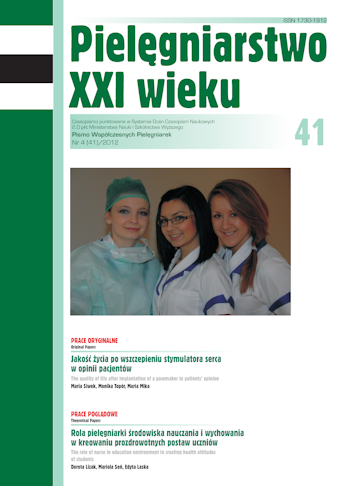Quality of life in patients diagnosed with unipolar affective disorder in depression phase in remission
Keywords:
quality of life, depression, degree of depression severity, fields of the quality of lifeAbstract
QUALITY OF LIFE IN PATIENTS DIAGNOSED WITH UNIPOLAR AFFECTIVE DISORDER IN DEPRESSION PHASE IN REMISSION
Introduction. Depression is one of the so-called affective disorders, i.e. diseases associated with the mood – manifested by: feelings of sadness, apathy, inability to experience pleasure and take pleasure in anything. Other important manifestations are inactivity, the loss of interests, reluctance to establish relationships with other people. Due to frequent persistence of depression symptoms there are changes in all areas of quality of life, which in turn hinders the process of psychiatric rehabilitation and maintenance of the status of remission.
Aim. The aim of this study was to assess the quality of life of patients diagnosed with unipolar affective disorder in depression phase in remission as well as the severity of depressive disorders in subjects.
Material and methods. Examinations were conducted at the Psychiatry Clinic for Adults in Cracow and included 105 patients. As the research tool a Beck Depression Inventory (BDI) was used which serves for the assessment of the severity of depression symptoms. In addition, the abridged version of the questionnaire assessing the quality of life– WHOQOL – BREFF was used.
Results and conclusions. Examinations confirmed that amongst patients with diagnosed unipolar affective disorders in the period of the remission, all degrees of severity of depression are stated. Depression, despair and fear are negative emotions which in the considerable way influence the quality of life, social relations and satisfaction.
References
1. Kępiński A. Melancholia. Warszawa: PZWL; 1985.
2. Pużyński S. Leksykon psychiatrii. Warszawa: PZWL; 2001.
3. Dudek D, Zięba A. Biologiczne podłoże depresji. Depresja. Wiedzieć aby pomóc. Kraków: Wydawnictwo Medyczne; 2002.
4. Tomb DA. Psychiatria. Wrocław: Urban & Partner; 1998.
5. Rogóż M. Jakość życia w zaburzeniach afektywnych jedno i dwubiegunowych. Niepublikowana praca doktorska. Kraków: Katedra Psychiatrii CMUJ; 2006.
6. Bujok G, Tambarkiewicz M. Jakość życia uwarunkowana stanem zdrowia jako nowy problem kliniczny. Wiadomości Lekarskie. 2005; LVIII: 1-2.
7. Chrobak M. Ocena i pomiar jakości życia zależnej od stanu zdrowia. Pismo Małopolskiej Okręgowej Izby Pielęgniarek i Położnych „Ad vocem”. 2009; 86: 20 – 23.
8. Wrońska I, Stępień R, Wiraszka G. Jakość życia w naukach medycznych. Pielęgniarstwo XXI wieku. 2004; 1 (6): 5 – 8.
9. Trojanowska A. Znaczenie badań nad jakością życia w medycynie. Zdrowie Publiczne. 2011; 121 (1): 91-103.
10. Majkowicz M, Zdun – Ryżewska A. Ocena jakości życia w zaburzeniach psychicznych – koncepcje, badania, narzędzia pomiaru. Psychiatria w Praktyce Klinicznej. Wydawnictwo Via Medica. 2009; Tom 2, nr 2:100 – 114.
Downloads
Published
Issue
Section
License
Copyright (c) 2012 Beata Ogórek-Tęcza, Małgorzata Sulisz, Alicja Kamińska (Autor)

This work is licensed under a Creative Commons Attribution 4.0 International License.




